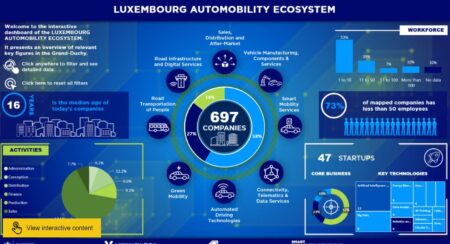National innovation agency Luxinnovation has recently presented the first-ever mapping of Luxembourg’s automotive sector. “The automotive industry, and in particular the development and production of automotive components, has a long tradition in Luxembourg,” says Anthony Auert, Luxembourg AutoMobility Cluster Manager at Luxinnovation. “Over the years, the industry has undergone profound changes dictated by the speed of innovation and time-to-market, cost pressure and post-crisis recovery.”
Luxinnovation produced the mapping in order to provide a comprehensive overview of the ecosystem and provide a better understanding of its evolution and the challenges ahead. The mapping exclusively covers companies active in the field of road mobility. It does not take into account other modes of transport (rail, air or water), nor logistic companies.
700 mobility companies
 It total, the automotive sector includes some 700 companies. Globally operating component suppliers such as Delphi, Goodyear, IEE, Carlex, ArcelorMittal and Cebi International are testimony to the usefulness of having European sales and R&D headquarters in Luxembourg. Structurally, however, the sector is mainly composed of small companies with less than 50 employees. These companies are well established with an average of 17 years of activity here.
It total, the automotive sector includes some 700 companies. Globally operating component suppliers such as Delphi, Goodyear, IEE, Carlex, ArcelorMittal and Cebi International are testimony to the usefulness of having European sales and R&D headquarters in Luxembourg. Structurally, however, the sector is mainly composed of small companies with less than 50 employees. These companies are well established with an average of 17 years of activity here.
58% of mobility companies have automotive and mobility as their main activity, and 27% as a secondary activity. The remaining 15% – 101 companies – are identified as service providers supporting the emergence of more intelligent and sustainable mobility.
It is very good news that companies have access to more than 100 local change catalyst firms that can support their transformation.
“These innovative service providers have a key role to play,” comments Mr Auert. “The automotive sector is changing profoundly, and it is very good news that companies have access to more than 100 local change catalyst firms that can support their transformation.”
Data analytics and artificial intelligence
Of the 700 companies, 47 are start-ups, more than half of which fall into the category of “disruptors”. These solution developers for the mobility of tomorrow frequently work in the fields of data analysis and artificial intelligence.
“The start-ups that have emerged in recent years do not only bring innovative – and often digital – solutions, they also have an agile way of working that is a source of inspiration for more traditional players,” Mr Auert notes.
The future start-up incubator hosted at Luxembourg’s Automobility Campus is expected to play an important role in the further development of this dynamic sector. It will promote cooperation, foster partnerships with established automotive and mobility players and leverage their research and development infrastructure. The sector is also supported by long-standing close collaboration between Luxembourg players and their counterparts in the surrounding regions in Belgium, Germany and France.
Image credit: Luxinnovation

